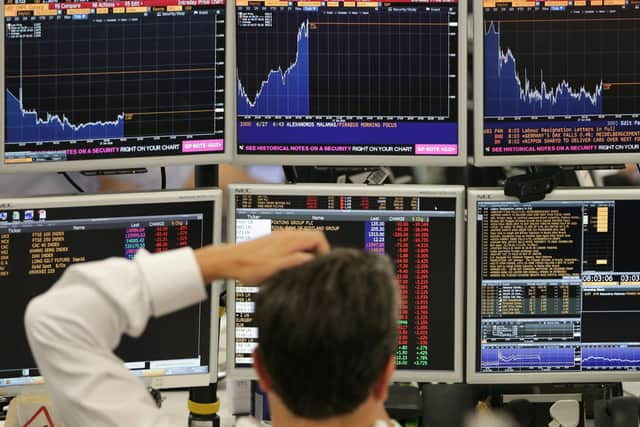Inflation killer: Cash savers see interest rate gains wiped out by soaring prices
Since January, UK savers have pocketed some £32 billion in interest from money squirreled away in the likes of instant and fixed-term savings accounts, cash ISAs and bonds. But, despite high interest rates benefiting those with cash to spare, inflation has eroded the value of savings by £69bn across the same period, according to the latest annual “Cost of Cash” research from Janus Henderson Investment Trusts.
The firm said many savers were failing to make the most of their nest eggs. Investors in global equities have seen returns six times greater than cash and beaten inflation comfortably across the year to date, despite global market volatility.
Advertisement
Hide AdAdvertisement
Hide AdWith bank interest rates at their highest level since 2007, and some fixed savings products offering returns as high as 6 per cent, those who have managed to save might consider themselves to be in a better position than in recent years. Between January and late September, they earned £32bn in interest across instant and fixed-term accounts, cash ISAs, National Savings & Investments (NS&I) and current accounts.


Janus also estimates that those savers will go on to earn a record £45bn in interest for the whole of 2023 - three times more than 2022, and more than they earned in the six years covering 2017 to 2022 combined. However, soaring prices have seen the value of British nest eggs depreciate by £69bn between January and late September 2023.
Dan Howe, head of investment trusts at Janus Henderson Investors, said: “The current environment is undeniably difficult to navigate. We are presented with the reality of rising costs not only as we go about our daily lives, but as we read the headlines too. Interest rates, despite being at their highest level in 15 years, are still not enough to fight the corrosive effects of inflation. Taken together, it’s no wonder that many UK savers are struggling to decide how to best protect the value of their hard-earned savings.”
He pointed out that global equity markets have had a good 2023 so far, not only easily beating cash savings, but also inflation. The MSCI World index of global stocks has returned a total 9.8 per cent between January and late September in a combination of income and capital gains. Meanwhile, the UK market returned a more modest 4.3 per cent.
Janus noted that £1,000 invested in global equities 25 years ago would be worth £5,936 today, compared to £1,631 invested in cash. Inflation comfortably exceeded compound cash interest over the same period too (consumer prices index inflation of 83 per cent versus compound interest of 63 per cent).


More than a fifth (22 per cent) of people surveyed by Opinium on behalf of Janus Henderson Investment Trusts believe that keeping cash in deposits or physically in notes and coins is the best way to protect their savings from the impact of inflation. Just 17 per cent selected shares in their various forms (e.g. as investment trusts, via funds or company stock).
When asked, a third of respondents (33 per cent) said they did not know what investments were typically good long-term shields against the effects of inflation. This figure is up from just over a quarter (28 per cent) a year ago.
Howe added: “Environments like the one we currently find ourselves in can make us understandably wary about investing our savings, but the research shows that keeping them in cash has not protected them from inflation in the long-term. Since the beginning of 2021 savers have seen inflation consume one sixth of their cash savings, even after interest income has been added. In 25 of the last 34 years, equity investments have delivered superior returns compared to holding cash, and can provide investors with a much-needed boost to income in terms of capital gains and dividend payments, particularly when those dividends are reinvested.”
Advertisement
Hide AdAdvertisement
Hide AdThe research comes as investor confidence is knocked by the current conflict in the Middle East and its impact on global markets. Investment firm Hargreaves Lansdown’s (HL) latest Investor Confidence Index has dropped seven points to 71. Responses from HL clients were gathered as Hamas launched its attack on Israel.
Confidence has risen in the Asia Pacific region but fallen in Europe, emerging markets, Japan and North America. The firm noted that investors continued to favour cash assets while markets were turbulent.
Emma Wall, head of investment analysis and research at Hargreaves Lansdown, said: “It is not surprising to see investor confidence has dropped following the devastating war in the Middle East. The conflict has impacted both oil and gold prices. But retail investors were already loading up on perceived lower-risk assets, thanks to market volatility, an uncertain global economic outlook, and compelling yields.
“Cash has an important part to play in your financial resilience. Three months’ salary is the rough guide for your rainy-day fund, to ensure you can weather personal uncertainty. It can also be a great tactical play in a portfolio – in a rising rate environment, with market volatility you are rewarded for keeping your powder dry. But it has limited long term strategic asset allocation benefits. Investors should be looking longer term – markets will be choppy over the next six months, but rates have peaked so holding cash in your investment portfolio no longer pays.”
Comments
Want to join the conversation? Please or to comment on this article.